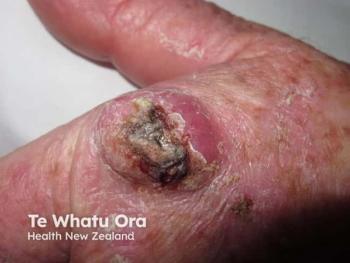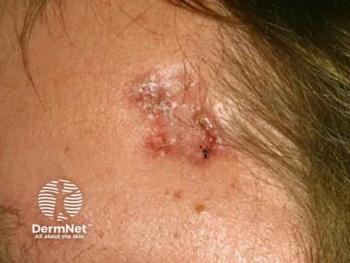
Genetic expression profiling for squamous cell carcinoma
For many years, genetic expression profiling has helped physicians predict which patients are at the highest risk of having their melanoma metastasize. Now, this same approach could aid in treating squamous cell carcinoma of the skin.
For many years, genetic expression profiling has been used in melanoma management to both make a more accurate diagnosis and assist in predicting which patients are at the highest risk of having their melanoma metastasize.
“One interesting next step is to apply this technology to other tumors,” said Laura Ferris, M.D., Ph.D., an associate professor of dermatology at the University of Pittsburgh in Pennsylvania. “One that is being worked on currently is squamous cell carcinoma of the skin.”
The test could help clinicians determine if a biopsied squamous cell carcinoma is at high risk of metastasizing to the lymph nodes or distantly.
“This is important information because we treat tumors that are at higher risk of metastasizing more aggressively with therapies such as radiation in addition to surgery,” says Dr. Ferris, who spoke about the potential of genetic expression profiling for squamous cell carcinoma at the Fall Clinical Dermatology Conference. “We may also consider chemotherapy for some high-risk patients. However, we want to reserve those treatments, which carry risk and have side effects, for those patients who are most likely to benefit from them.”
In clinical practice, the testing for squamous cell carcinoma should be similar to melanoma, using formalin fixed paraffin-embedded tissue section.
“With information from genetic profiling, we hope to be able to better determine what kind of follow-up a patient needs,” Dr. Ferris says. “Perhaps for high-risk tumors, a patient may be deemed a better candidate for radiation or simply more frequent surveillance.”
Dr. Ferris also notes that although it is helpful to have a test that provides more information, “that is only half the battle. The second half is deciding what you do with that information and how it changes your care.”
Dr. Ferris has been an investigator for Castle Biosciences, both for its commercially available melanoma prediction assay and the assay in development for squamous cell carcinoma. “Castle is the only company I know of that is developing a commercial assay for squamous cell carcinoma,” she says.
Preliminary validation assay studies totaling 107 tumors (107 patients) and the expression of 40 different genes found that a much higher percentage of patients with a high-risk gene profile metastasized compared to a low-risk gene profile, which is significantly more accurate than traditional staging systems.
The sensitivity was 53%, which is similar to standard staging systems, but the specificity was 93%.
Furthermore, the positive predictive value (PPV) was 60% compared to roughly 40% for typical staging systems.
“I did not know what to expect, but these results are encouraging,” Dr. Ferris says.
A larger data set of over 300 patients will be presented later in October at the annual meeting of the American Society for Dermatologic Surgery (ASDS) in Chicago.
Disclosures:
Dr. Ferris is a consultant and investigator for DermTech and SciBase, as well as an investigator for Castle Biosciences.
References:
Ferris, LK, Cockerell, CJ. Genetic Expression Profiling Beyond Melanoma Prognosis. Presented at: 2019 Fall Clinical Dermatology Conference; October 17, 2019; Las Vegas, NV.
Newsletter
Like what you’re reading? Subscribe to Dermatology Times for weekly updates on therapies, innovations, and real-world practice tips.









